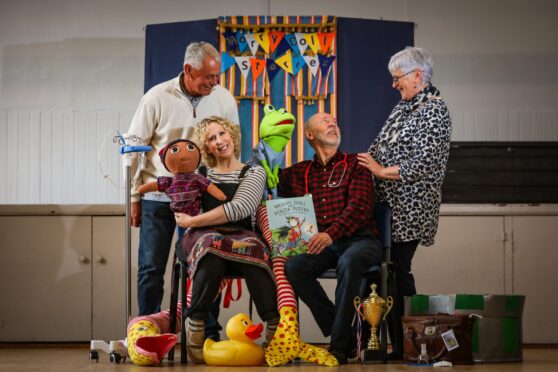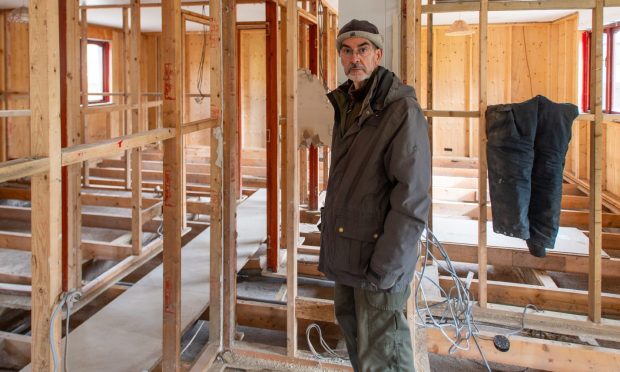Health and care officials in Angus have apologised after “failing” a cancer patient who was allowed to die “without dignity”.
A significant case review has revealed details of the final days of the patient, referred to only as P19, who died aged 50 in December 2018 from advanced bowel cancer.
The report states that, while P19 could not have been prevented from dying, they were failed by support services in a number of ways – including being left to live in “squalid” and “horrendous” conditions.
The report said: “P19’s life may have been extended and they should have been allowed to die well and die with dignity but were failed this in the last few months of life.”
It also highlights potential failings in the support given to staff involved – some of whom are facing ongoing mental trauma.
The review – which focuses on the four months before P19’s death – was commissioned by Angus Council “to identify and maximise any opportunities for local and national learning and improvement”.
What went wrong?
The report describes P19’s situation as “complex” and says the patient had a range of health and social care needs.
They had been diagnosed in 2014 with multiple sclerosis and had used alcohol heavily in the past.
The patient was identified as an “adult at risk” in August 2018 due to having bowel cancer and was incontinent as a result.
At the time of their death they were “emaciated” and weighed just over six-and-a-half stones.
Despite the involvement of 19 services across a wide range of agencies and organisations, the report found multiple failings. These included:
- “Poor” record-keeping across several service areas
- A lack of effective information-sharing across services that were assisting P19
- The healthcare team “failed to recognise and reach an agreement that P19’s death was expected and imminent” – resulting in the patient dying with “uncontrolled physical, emotional, social and spiritual symptoms”
- A lack of planning around P19’s care
- Missed opportunities to work with P19 on their health and personal care needs
- No referral being progressed after a number of falls involving the patient
- Unclear “lines of professional accountability… within different services”
- Professionals who assessed P19 “did not appear to have an understanding
of the link between prolonged alcohol use and impaired mental capacity” - A lack of understanding among staff about what had led to the extent of P19’s “self-neglect” – while staff did not know where to turn for guidance or advice
- There was no regular programme of inspecting properties that would have led to “uninhabitable” living conditions being identified at a “much earlier stage” – and P19 would not have had to live in the “squalid conditions they were found in, for the length of time that they did”
- Not all legal powers available were considered
The report concluded: “P19 was recognised as an adult at risk and there seems to have been a genuine effort on the part of professionals involved to engage and support P19, albeit unsuccessfully to the point of being able to prevent death as a result of advanced bowel cancer.
“Clearly, there are lessons to be learned from the events that led to such a sad outcome and these have been reflected in the learning and recommendations within this report.
“This case highlights a number of challenges that exist for professionals when the needs of an individual do not neatly meet the criteria for existing services and leads to unmet needs.”
There may have been a failure towards the moral, legal and ethical responsibilities for the wellbeing of staff
Significant case review
The report also highlights the “traumatic experience” for staff of “seeing someone die in front of their eyes with no palliative care in place, no pain management, no dignity and
feeling that nothing was being done despite their repeated escalation”.
It reveals how staff were in tears at P19’s situation and felt “helpless”, with some requiring ongoing counselling and support, adding: “As a result of this there may have been a failure towards the moral, legal and ethical responsibilities for the wellbeing of these staff.”
A series of recommendations have now been made to the agencies involved.
How have Angus health and care agencies responded?
Ewen West, independent chair of Angus Adult Protection Committee, says all recommendations made to the committee have been accepted and some have already been acted upon.
He said: “This review makes clear that support from services must never be so inflexible that it cannot adapt to the needs of the individual, or their unique circumstances.”
He expressed “sincere condolences” to the patient’s family and thanked them for the contributions they made to the report.
Gail Smith, chief officer at Angus Health and Social Care Partnership, said: “I want to publicly apologise on behalf of Angus Health and Social Care Partnership for our failings in the care and treatment of P19.
“We take the findings of the significant case review very seriously and accept all of the recommendations.
“I have written to P19’s family to unreservedly apologise for our failings. I have assured them that we are taking immediate steps to act upon the learning of this case and be relentless in our efforts to improve the quality and consistency of our care as a result of this.”
She says it was a “very complex situation for all staff involved” but that P19 was let down, and that she is determined that lessons will be learned.
Claire Pearce, director of nursing and midwifery at NHS Tayside, has also issued a public apology on behalf of the health board.
She says it “fully accepts” all the recommendations and will work with the relevant agencies “to ensure all learning from the issues raised is shared… and together we continue to make the necessary improvements to services supporting the most vulnerable people in our communities”.
Chief Superintendent Phil Davidson, chair of the Chief Officers Group for Angus, says improvements in a number of areas have already progressed.
These include “strengthening information sharing and monitoring procedures, making sure the right people are involved at the right time according to a person’s individual needs, and clearer guidance to all partners on the referral of cases”.










